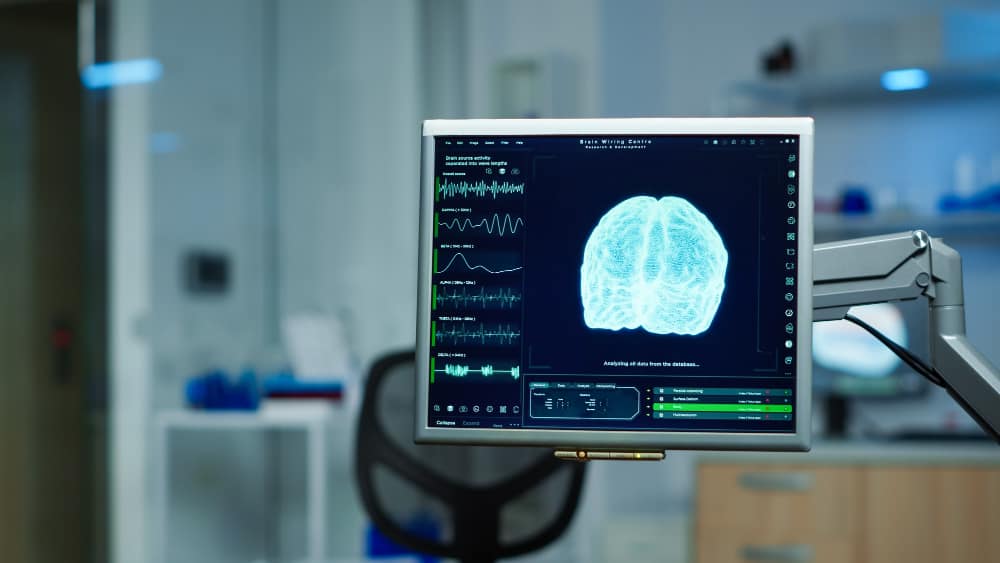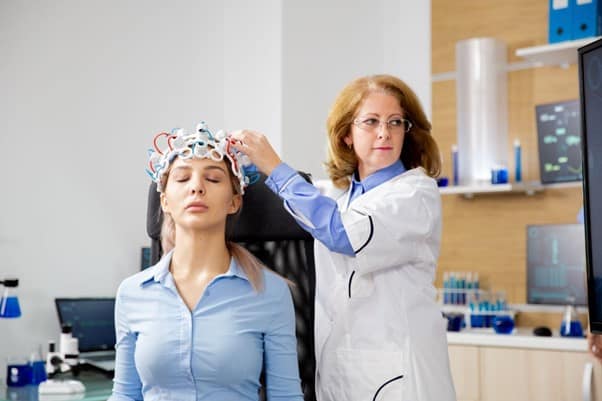The Science Behind the TMS Treatment

Introduction of Science Behind the TMS Treatment
Jaslok Hospital & Research Centre offers the best TMS treatment in Mumbai and suggests that Deep Transcranial Magnetic Stimulation (dTMS) is an innovative therapeutic approach gaining recognition in the field of mental health. This non-invasive procedure involves using electromagnetic pulses to stimulate specific regions of the brain associated with mood regulation and cognition. TMS has shown promise as a treatment for various mental health conditions, including depression, anxiety, and obsessive-compulsive disorder. By modulating neural activity in targeted brain regions, the TMS treatment hospital aims to alleviate symptoms and improve overall mental well-being. Understanding the science behind TMS is crucial to appreciate its potential benefits and explore its application in the evolving landscape of mental health treatments.
Understanding TMS
What is the theory of TMS? A non-invasive neuromodulation technique called transcranial magnetic stimulation (TMS) is used to treat mental illness. It involves delivering magnetic pulses to specific brain areas to regulate neural activity. TMS has shown effectiveness in conditions like depression and OCD by positively impacting mood and cognition. This TMS therapy is gaining recognition for its potential to offer relief when traditional treatments are insufficient or produce undesirable side effects.
What Does Transcranial Magnetic Stimulation Mean?
Transcranial magnetic stimulation (TMS) is a non-invasive neurostimulation technology utilized in neurological and mental health therapies. The doctors at the best TMS treatment hospital in Mumbai say it involves delivering repetitive, electromagnetic pulses to targeted areas of the brain’s surface. By modulating neural activity, TMS aims to alleviate symptoms of various conditions, including depression, anxiety, and OCD. This therapy has gained attention for its potential to provide relief when traditional treatments are ineffective or not well-tolerated.
A Non-Invasive Approach to Brain Stimulation
Is TMS painful? Transcranial Magnetic Stimulation (TMS) offers a non-invasive method of brain stimulation. The TMS treatment utilizes electromagnetic pulses to target specific brain regions associated with mood regulation and cognition.
TMS has gained recognition for its potential in treating mental health conditions like depression, anxiety, and OCD, providing an alternative to traditional therapies or medications.
Its non-invasive nature makes it a promising option for individuals seeking effective and well-tolerated treatment options.
What is the science behind TMS Therapy? The Magnetic Stimulation Process
Transcranial Magnetic Stimulation (TMS) involves a precisely controlled process of delivering magnetic pulses to specific brain areas. These pulses, generated by an electromagnetic coil, modulate neural activity in targeted regions associated with mood and cognition. The TMS treatment is administered in sessions, typically over several weeks, aiming to alleviate symptoms of various mental health conditions. The magnetic stimulation process is non-invasive and well-tolerated, offering a promising therapeutic option for individuals seeking relief from their symptoms.
Generating Magnetic Fields: Coil and Pulse
In Deep Transcranial Magnetic Stimulation (dTMS), the generation of magnetic fields is central to its therapeutic effect. An electromagnetic coil, placed on the scalp, delivers controlled magnetic pulses to specific brain areas. These pulses induce electrical currents in the brain’s neurons, modulating their activity. By targeting regions associated with mood and cognition, TMS treatment aims to alleviate symptoms of various mental health conditions. This precise and non-invasive method has shown promise as an effective treatment option.
Targeting Specific Brain Regions
Transcranial Magnetic Stimulation (TMS) is designed to target specific brain regions associated with mood regulation and cognition. By precisely focusing magnetic pulses on these areas, TMS treatment aims to modulate neural activity and alleviate symptoms of mental health conditions like depression, anxiety, and OCD. This targeted approach ensures that the treatment is tailored to the individual’s needs and can offer relief when traditional therapies or medications prove inadequate.
Neural Response to TMS
Deep Transcranial Magnetic Stimulation (dTMS) elicits a neural response in the brain. When the magnetic pulses are delivered to specific regions, they induce electrical currents in the neurons, modulating their activity. As per our doctors at the best TMS treatment hospital in Mumbai, this neural response can lead to changes in mood and cognition, making TMS a valuable therapeutic tool for conditions like depression and OCD. Understanding how the brain responds to TMS is crucial for optimizing its effectiveness in treating various mental health disorders.
Neuronal Activation and Connectivity
Transcranial Magnetic Stimulation (TMS) triggers neuronal activation and connectivity changes in the brain. When magnetic pulses are applied to targeted regions, they stimulate neural circuits and promote communication between brain areas associated with mood regulation and cognition. This process can lead to positive therapeutic effects, making TMS treatment a promising option for individuals seeking relief from mental health conditions. Understanding the impact of TMS on neuronal activation and connectivity is essential for optimizing its clinical applications.
The Role of Synaptic Plasticity
Synaptic plasticity plays a crucial role in the effects of Transcranial Magnetic Stimulation (TMS). This phenomenon involves the strengthening or weakening of synaptic connections between neurons, contributing to learning and memory processes. TMS can induce synaptic plasticity by modulating neural activity in targeted brain regions, potentially leading to long-lasting changes in neuronal connectivity. Understanding how TMS treatment impacts synaptic plasticity is central to harnessing its therapeutic potential for various mental health conditions.
Mechanisms of Therapeutic Action
TMS exerts its therapeutic action through various mechanisms. According to the best TMS treatment doctors in Mumbai, it can modulate neural activity, promote synaptic plasticity, and enhance connectivity between brain regions. By targeting specific areas associated with mood and cognition, TMS aims to alleviate symptoms of mental health conditions like depression and OCD. Understanding these mechanisms is crucial for refining TMS protocols and optimizing its effectiveness as a non-invasive treatment option.
Alleviating Mood Disorders
TMS has shown promise in alleviating mood disorders like depression and anxiety. By precisely targeting brain regions associated with mood regulation, TMS treatment can modulate neural activity and promote positive therapeutic effects. This non-invasive approach offers an alternative treatment option, particularly for individuals who may not respond well to traditional therapies or medications. Understanding TMS’s potential in alleviating mood disorders is essential for improving mental health care outcomes.
Enhancing Cognitive Function
To improve cognitive functions, TMS can modify neural activity by stimulating particular brain regions linked to cognition. For those looking to improve their cognitive function, especially in circumstances where cognitive deficiencies are common, this non-invasive method presents a potential option. The TMS therapy can be used in the field of cognitive neuroscience and the treatment of mental illness, it is crucial to comprehend how it can improve cognitive function.
Customization and Treatment Planning
According to the doctors at our TMS treatment center in Mumbai, customization and treatment planning are essential aspects of Deep Transcranial Magnetic Stimulation (TMS). Each individual’s condition and needs are unique, requiring tailored TMS protocols. Clinicians consider factors like the target brain region, frequency, and intensity of magnetic pulses, along with the duration of treatment. This personalized approach ensures that TMS effectively addresses specific mental health conditions while minimizing side effects, making it a valuable option in the realm of individualized medicine.
Individualized Protocols for Optimal Outcomes
Individualized protocols are crucial for optimizing outcomes in Transcranial Magnetic Stimulation (TMS) therapy. Clinicians carefully assess each patient’s condition, identifying the most appropriate target brain regions, frequency, and intensity of magnetic pulses, and treatment duration. This personalized approach ensures that TMS treatment is tailored to the individual’s specific needs, maximizing its effectiveness in alleviating symptoms of conditions like depression, anxiety, and OCD while minimizing potential side effects.
Tailoring TMS for Specific Conditions
Tailoring the Transcranial Magnetic Stimulation (TMS) for specific conditions is vital for its effectiveness. Doctors customize treatment parameters, such as the target brain region and stimulation intensity, to match the unique characteristics of each mental health condition, whether it’s depression, anxiety, OCD, or others. The individualized approach our TMS treatment hospital in Mumbai ensures that TMS addresses the underlying neural mechanisms of the condition, optimizing the chances of symptom relief and improved overall mental well-being.
The science behind Transcranial Magnetic Stimulation (TMS) is rooted in its ability to modulate neural activity and promote therapeutic effects in various mental health conditions. By targeting specific brain regions associated with mood, cognition, and other functions, TMS offers a non-invasive approach to alleviating symptoms of disorders like depression, anxiety, and OCD. The generation of magnetic fields, precise coil placement, and customization of treatment parameters contribute to its success. Understanding the scientific principles underlying TMS is essential for harnessing its potential and expanding its role in mental health treatment, offering hope to individuals seeking relief from these conditions.
Best TMS Treatment Hospital in Mumbai
Jaslok Hospital & Research Centre is a leading hospital that offers the best TMS treatment in Mumbai for patients suffering from various mental health disorders. To assist patients in alleviating their symptoms and attaining a higher quality of life, their team of skilled medical professionals uses cutting-edge technologies and individualized treatment regimens. The hospital is equipped with modern facilities and offers comprehensive care for patients with different needs. Whether you are struggling with depression, anxiety, or other mental health issues, Jaslok Hospital & Research Centre provides the best TMS treatment in Mumbai the place to seek specialized treatment and care.





